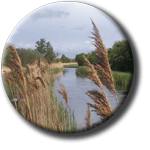Naturenet: Navigation law and access to water
Navigation Law
and access to water
Access to the land surrounding a water body does
not necessarily give you the right of access to the water, or to fish, launch a boat or swim. There is no general right of access
to river banks and towpaths - they all belong to somebody and that landowner may or may not choose to allow access. However, many
footpaths and other rights of way do run along river banks and towpaths, as these are often the routes people have used
for many years. A canal towpath or the bank of a navigable river is legally a part of the waterway.
and other rights of way do run along river banks and towpaths, as these are often the routes people have used
for many years. A canal towpath or the bank of a navigable river is legally a part of the waterway.
In England and Wales, any questions about use of inland waterways are probably best first addressed to the
Environment Agency .
.
Beaches are owned, although
almost all beaches allow public access, often because of the practical impossibility of preventing it. However, there is no right
to cross private land to gain access to a beach. If a beach is closed to the public there should be a sign saying so or a fence
to prevent all access.
The foreshore is the area between the high water mark and the low water mark. When the tide is in there is an
absolute right to navigate through the water (although not necessarily a right to land a boat or launch one) and so it is not
possible to fence off foreshore areas, as this would limit navigation. All foreshore belongs to the Crown unless it has in the
past been sold or given away. This has occurred in a few places. However, there is no legal right of access to the foreshore.
There are often bylaws prohibiting baitdigging on or near the foreshore, which is probably the most common reason for people to
use such areas. In any case such baitdigging is usually prohibited on an SSSI , although for the same reasons
this is almost impossible to enforce.
, although for the same reasons
this is almost impossible to enforce.
It is sometimes suggested that there is a general right of access to the foreshore (similar to the right to use
a public right of way or a village green). That this does not exist is obvious in that there are private foreshores where you
can't go; although they are not common. If there was a general right of access then such things couldn't exist.
The inland extent of foreshore is a question over which much legal ink has been spilt, and the best that can be said is that there is no firm definition that will apply in all cases. If it's important, to get an answer for any given area you're going to need to consult a solicitor, and need deep pockets.
The Crown Estate gives what it calls a "general permissive consent" for "non-commercial public access along the foreshore" it
controls. This also implies that such permission is necessary and that other landowners might not grant it. Approximately half of
the UK foreshore and around half of the tidal riverbeds are owned by the Crown and managed by The Crown Estate, in addition to
virtually the entire UK seabed out to 12 nautical miles (See a map of these areas here). The Crown Estate is governed by The Crown Estate Act 1961. The Crown Estate is a landowner and not a regulatory authority. The Crown is the prima facie owner of foreshore, or land between mean high
water and mean low water, by virtue of prerogative right. (Halsburys Laws Vol 12 (1), 1998 Reissue,para 242). The same applies to seabed, being land below mean low water. This, in effect, means that the Crown owns all of it unless it has in the past given it away or sold it.
Other owners of foreshore include, for example, the Duchies of Cornwall and Lancaster, local authorities, RSPB,
National Trust, MOD and some is in the ownership of private individuals.
See more about Crown
Estate boundary issues here in this briefing note.
From CRN News Volume 4 Number 2 June 1996.
Catherine Etchell summarises the rights of water users in England and Wales
 Under
English and Welsh law there is, at present, no general right for one person to exercise rights over property belonging to another
and there is no general public right of access to property belonging to another. The right to fish and the right to navigate are
governed by the same law. The equivalent of a public right of way on land is the public right of navigation.
Under
English and Welsh law there is, at present, no general right for one person to exercise rights over property belonging to another
and there is no general public right of access to property belonging to another. The right to fish and the right to navigate are
governed by the same law. The equivalent of a public right of way on land is the public right of navigation.
Historically, rights of navigation are based on commercial need and recreational navigation has followed more
recently. In relative terms recreational navigation and canoeing in particular are young sports. Angling has a history going back
hundreds of years. The result is that the law relating to fishing rights is well established.
It is a general principle of English law that the owner of land bordering on a watercourse also owns the bed of
that watercourse up to an imaginary line drawn down the middle. The common law concerning trespass relates to water in the same
way as it does to land. The owner of land fronting onto a watercourse can stop people travelling over or to that part of the
watercourse owned by them in exactly the same way as they can stop people walking over their land without permission or fishing
from their land into the watercourse without their permission.
A riparian owner can expressly dedicate a stretch of river under their control for public use although this
appears to be quite rare. These forms of dedication are what make up the Common Law of navigation. A right of navigation where it
exists is a right to use the river to its full capacity. There is no such thing as a limited right of navigation such as a right
limited to canoes. The creation of navigation routes over watercourses where no public rights of navigation exist without the
consent of all persons having an interest in the bed of the river will involve changing the law by Act of Parliament, although it
might be possible to do so using existing powers of compulsory purchase. Where a public right of navigation does not exist,
agreements to use the river can be negotiated with the owner of the riverbank who controls the right to use the river.
If you are interested in the position in Scotland, read Scottish Natural Heritage’s Access Review
Research Report 'The Law of Access for Water Based Recreation', 1991.

 Under
English and Welsh law there is, at present, no general right for one person to exercise rights over property belonging to another
and there is no general public right of access to property belonging to another. The right to fish and the right to navigate are
governed by the same law. The equivalent of a public right of way on land is the public right of navigation.
Under
English and Welsh law there is, at present, no general right for one person to exercise rights over property belonging to another
and there is no general public right of access to property belonging to another. The right to fish and the right to navigate are
governed by the same law. The equivalent of a public right of way on land is the public right of navigation.